Allahumma Afini Fi Badani Meaning, Arabic Text, And Pronounciation
Allahumma afini fi badani meaning is so versatile. It can be considered for the overall well-being supplication.
Advertisements
The messenger of Allah used to recite this Dua on a regular basis. It is Sunnah to recite this Dua 3 times in the morning and 3 times in the evening. Below is the full Dua meaning in English.
Allahumma Afini Fi Badani Meaning In English
Allahumma Afini fi badanee means O Allah, grant me well-being in my body. O Allah, grant me well-being in my hearing. O Allah, grant me well-being in my sight. There is none worthy of worship but You. O Allah, I seek refuge in You from disbelief and poverty and I seek refuge in You from the punishment of the grave. There is none worthy of worship but You.
Allahumma Afini Fi Badani Arabic
اللّهُـمَّ عافِـني في بَدَنـي ، اللّهُـمَّ عافِـني في سَمْـعي ، اللّهُـمَّ عافِـني في بَصَـري ، لا إلهَ إلاّ أَنْـتَ. اللّهُـمَّ إِنّـي أَعـوذُ بِكَ مِنَ الْكُـفر ، وَالفَـقْر ، وَأَعـوذُ بِكَ مِنْ عَذابِ القَـبْر ، لا إلهَ إلاّ أَنْـتَ
Transliteration
Allahumma afini fi badanee, Allahumma afini fi sam’i, Allahumma afini fi basari La ilaha illa anta. Allahumma inni a’uzubika minal kufr wal fakar. Wa a uuzu bika min azabil qabr. La ilaaha illaa Anta.
Advertisements
Allahumma Afini Fi Badani Hadith
Narrated AbuBakrah: AbdurRahman ibn AbuBakrah said that he told his father: O my father! I hear you supplicating every morning: “O Allah! Grant me health in my body. O Allah! Grant me good hearing. O Allah! Grant me good eyesight. There is no god but Thou.”
You repeat them three times in the morning and three times in the evening. He said: I heard the Messenger of Allah (peace be upon him) using these words as a supplication and I like to follow his practice.
Sunan Abi Dawud 5090
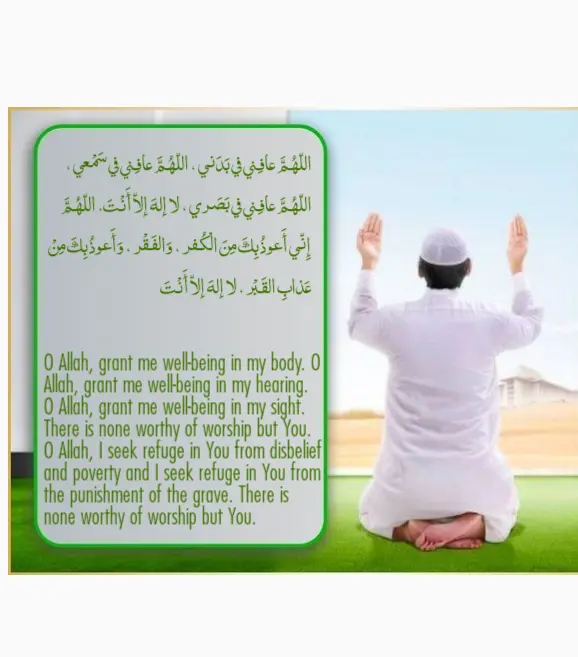
Here are similar supplication:
Commentary
This beautiful dua is a comprehensive supplication that covers various aspects of a person’s life, seeking Allah’s protection and blessings for the body, senses, faith, financial well-being, and the hereafter.
It is a powerful and meaningful prayer that encapsulates the core principles of Islamic faith and the desire for a balanced and fulfilling life in this world and the next.
Here is the break down this beautiful dua (supplication):
1. Well-being in the Body:
Advertisements
- This part of the dua is a prayer to Allah for physical health and well-being. It emphasizes the importance of being in good health to carry out one’s daily activities and fulfill their responsibilities.
2. Well-being in Hearing:
- This part of the dua is a request for the preservation of one’s ability to hear. Hearing is a precious gift, and this supplication seeks to maintain this blessing and avoid any hearing impairments.
3. Well-being in Sight:
- Similar to hearing, this part of the dua is a plea for the protection and preservation of one’s vision. It acknowledges the value of sight in navigating the world and appreciating its beauty.
4. Monotheism (Tawheed):
Advertisements
- The phrase “There is none worthy of worship but You” is a fundamental declaration of monotheism, emphasizing the belief in the oneness of Allah. It is a reminder of the core principle of Islam, that there is no deity or power except Allah.
5. Seeking Refuge from Disbelief:
- This part of the dua seeks protection from disbelief or the rejection of faith. It is a request to Allah to keep one steadfast in their belief and shield them from any doubts or disbelief.
6. Seeking Refuge from Poverty:
- Poverty can bring about hardship and suffering, so this section of the dua implores Allah for protection from poverty. It is a plea for financial well-being and sufficiency.
7. Seeking Refuge from the Punishment of the Grave:
- The grave is a place where a person’s actions are weighed and where they face the consequences of their deeds. This part of the dua seeks refuge from the punishment that may befall someone in the grave, emphasizing the importance of seeking Allah’s mercy and forgiveness.
8. Reiteration of Monotheism (Tawheed):
- The dua concludes by reaffirming the belief in the oneness of Allah, stressing that there is no deity worthy of worship except Him. This repetition reinforces the central concept of monotheism in Islam.
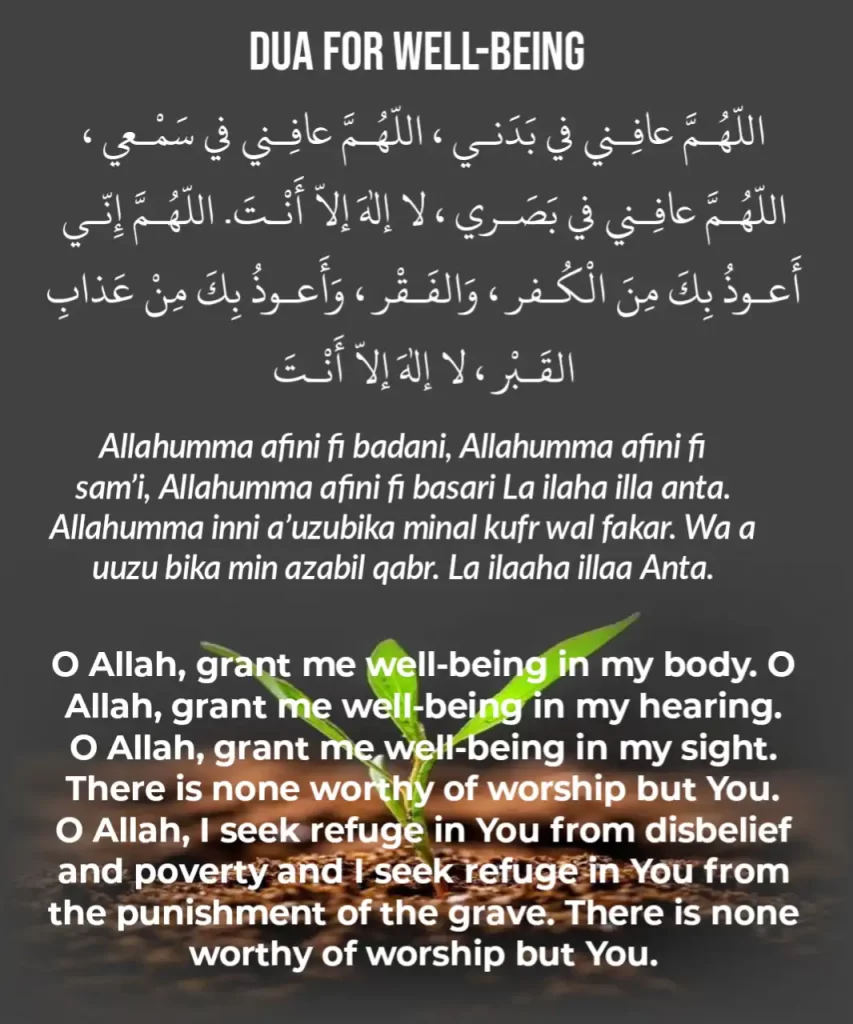
Brief Commentary
- The companion Abu Bakrah, reported that he heard the Prophet (SallaAllahu ‘alayhi wasallam) repeat this supplication three times in the morning, and once more three times in the evening.
- By asking Allah to grant us well-being in our body, we are asking to be cured from all physical and spiritual ailments, so that we possess both a healthy body and a pure heart, and therefore use this healthy body in a way that pleases Allah.
- Although the seeing and hearing are both senses of the body, they have been singled out owing to their utmost importance. These two senses provide direct routes to our heart, and therefore we desire that they be pure to ensure that our heart only receives that which is pure and beneficial.
- The heart is an important body part that affects the whole body in this life and the hereafter. The Prophet (SallaAllahu ‘alayhi wasallam) said that if the heart is sound, the whole body is sound, and if the heart is corrupted, the whole body will be corrupted.
- By concluding the first segment of the supplication by affirming that none is worthy of worship except Allah, it is as if we are reminding ourselves why we want this well-being, and that is so that we can use it to worship Allah.
- In the first segment of the supplication, we ask Allah to grant things to us, and in the latter segment, we seek refuge in Him alone from some things.
- We seek refuge in Allah from disbelief as it will lead to eternal punishment in the hereafter and leads to the wrath of Allah.
- We seek refuge in Allah from poverty as it can lead to being displeased with the decree of Allah, which may eventually lead to disbelief in Allah.
- We seek refuge in Allah from the punishment of the grave as you could be a Muslim but be punished in the grave so it isn’t sufficient to stay away from disbelief alone, but you should stay away from all forms of disobedience.
- The second supplication concludes by affirming that none is worthy of worship except Allah. We are again reminding ourselves of this, as by worshipping Allah, we can be saved from these things we are seeking refuge from, or saved from their ill-effects.
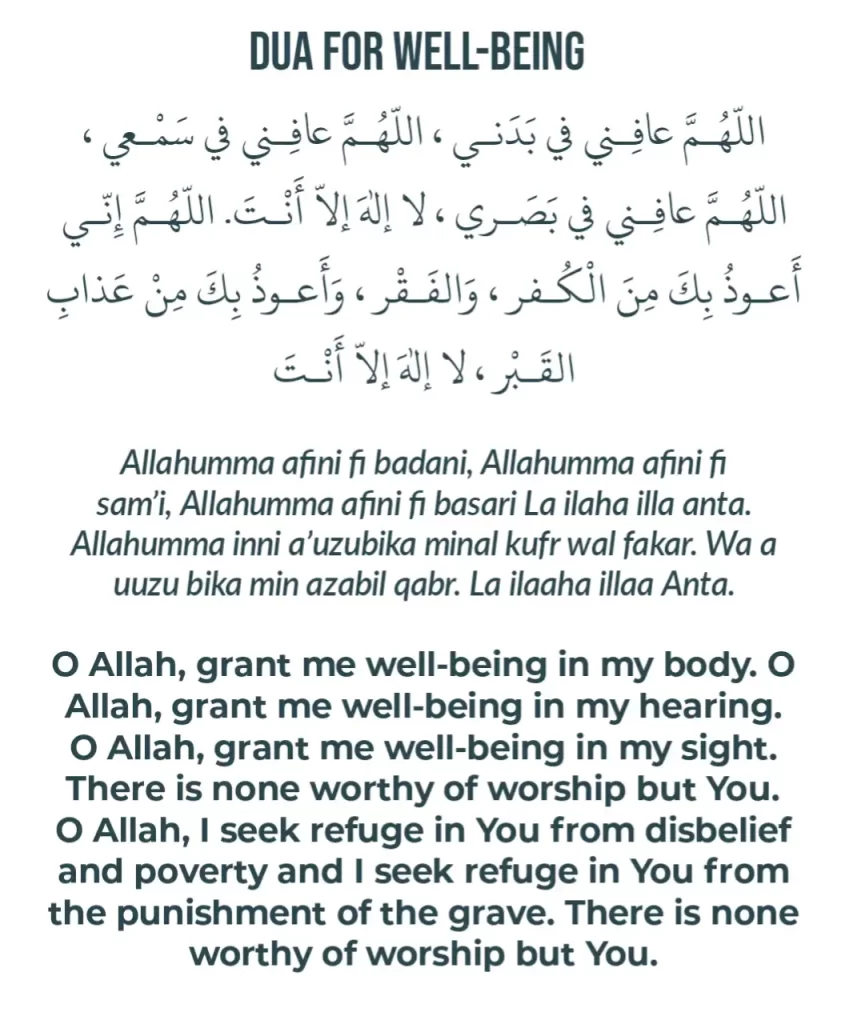
Benefits Of Allahumma Afini Fi Badani
- In this supplication, we ask Allah for well-being in our body, our sight, and our hearing. This means these are very important matters that we take for granted, when we should be praising Allah for them, and looking after them.
- Nothing in this religion is there to teach us to get a better dunya for the sake of it alone. It is all to be sought solely as a mechanism to help us live in accordance with Allah’s commandments, therefore we are only asking for this well-being so that we use it in a way that pleases Allah. Ensure you have this intention in your heart every time you make this supplication.
- We now live in a society where the pleasures through sight and hearing are readily accessible, so it is incumbent upon us to ensure we save these senses from being used for disobedience, and ensure we use them to come closer to Allah.
- Poverty can lead a person to disbelief, so we should strive and remove poverty wherever possible, by giving in charity and looking after the poor.
- Don’t just say these supplications every morning and evening, but always ponder over what impact they should have on your life, and what key points are they highlighting.
Advertisements

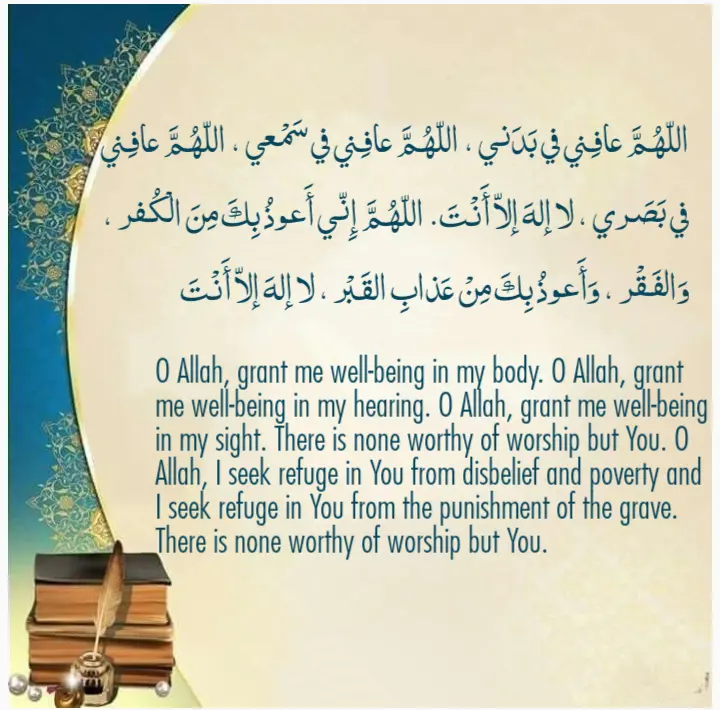


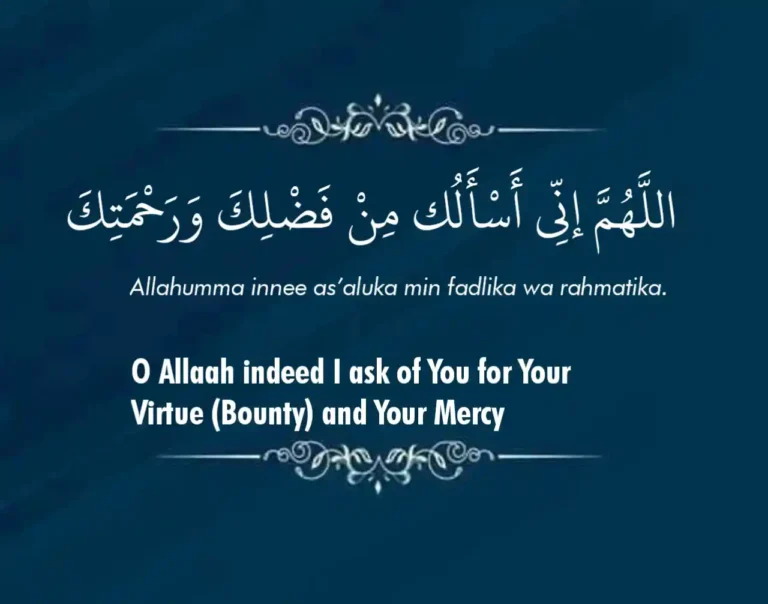
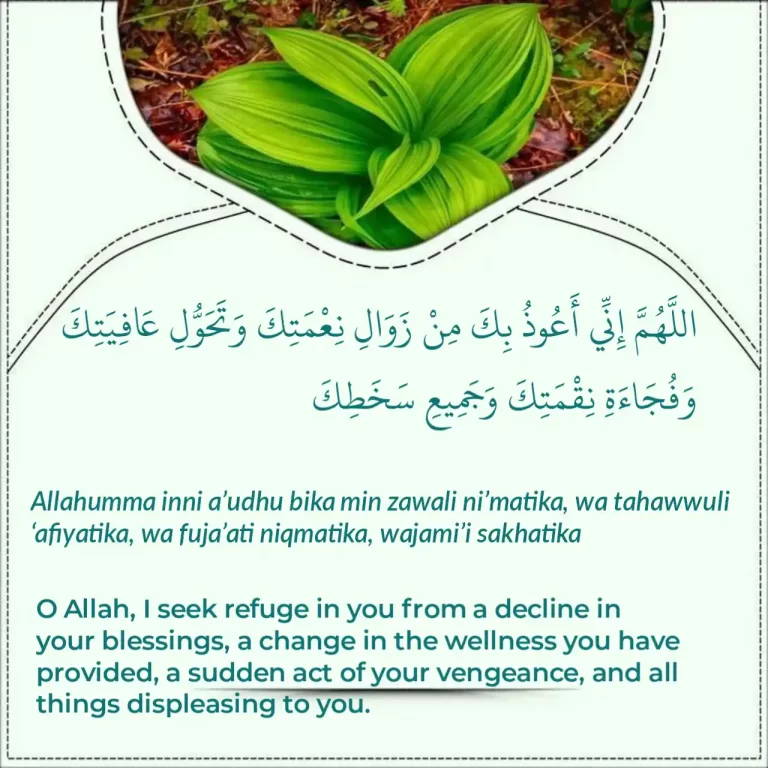


3 Comments